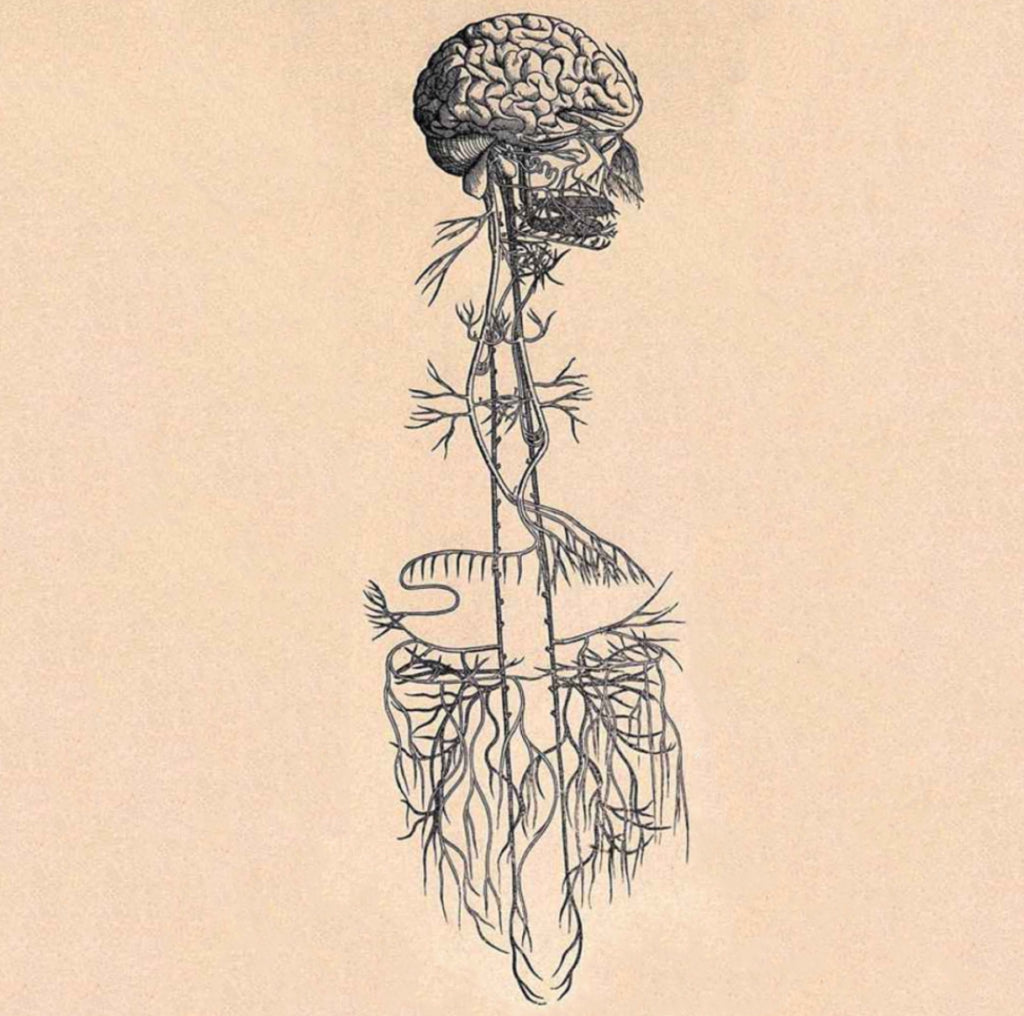It is common to hear people talk about ‘gut feelings’, ‘gut reactions’, or perhaps a ‘feeling in the gut’, and you will probably at some point have experienced butterflies before a stressful event or after an upsetting encounter.
You may be surprised to know that the gut has as many neurons as the spinal cord and these ‘feelings’ or ‘sensations’ are emotional intuitions which travel up to your brain via the vagus nerve through a mind-body feedback loop.
The Vagus Nerve also known as the ‘wandering nerve’ is the longest nerve in the body. It is rooted in the brain where it diverges from roots that wander down the body touching all the major organs along the way before embracing the lowest viscera of the abdomen.

Early anatomical drawing of the vagus nerve
This sophisticated neural network is critical for optimal health sending signals to all the bodily organs.
I love this old anatomical drawing. You can see so clearly how mind and body are connected and how one impacts the other. The nerves around the gut are amazing. You can really begin to understand those gut feelings!
The vagus nerve is commander-in-chief of the parasympathetic nervous system also know as the ‘rest and digest’ system; the polar opposite to the ‘fight or flight’ sympathetic nervous system which controls the body’s response to any perceived threat.
When the vagus nerve is not functioning correctly, given its most important role in the bodily systems, it can cause digestive disharmony including ulcerative colitis, bulimia, IBS and acid reflux to name but a few.
Loss of vagal nerve tone is also associated with depression, cardiovascular disease, inflammation, autoimmune thyroid conditions, lupus and chronic fatigue.
Any time you feel stressed, worried, intimidated or under pressure your vagus nerve ‘disconnects’. Poor vagal nerve tone can produce quite pronounced symptoms without the presence of an organic disease. They may be dismissed as being psychosomatic or all in the head.
Symptoms of loss of vagal tone
- Tightness in the throat or difficulty swallowing.
- Neck tension
- Palpitations
- Epigastric pain
- Tingling or numbness in the hands or feet.
- Strange intermittent abdominal pains.
- Weakness
- Frequent urination
- Shaking and nervousness.
- A slight inability to form words.
- Frequent urination (this can be due to high cortisol).
An ‘active’ vagus nerve returns the body to homeostasis and equilibrium.
The active vagus nerve and your health
- Helps increase stomach acid, digestive juices and motility in the gut. Low stomach acid, the cause of most acid reflux is often due to poor vagus nerve tone. It not only controls stomach acidity but also the oesophagus.
- Helps control anxiety and depression in the brain.
- Releases intrinsic factor, vital for B12 absorption.
- In the heart vagus nerve activation helps control blood pressure, heart rate variability and lowers the risk of heart disease.
- Helps release bile in the gallbladder to help you break down fat and release toxins.
- Helps control blood glucose levels via the pancreas and liver.
- A healthy vagus nerve allows easy bowel movements as it controls mucus production.
- Helps release tears and helps control taste and saliva.
- The vagus nerve can help to reduce pain.
- It is important for the release of testosterone.
- It has an anti-inflammatory effect on all bodily systems.
The healing capacity of the vagus nerve is remarkable but how do you activate it?
It is easier than you think and the body in its innate wisdom is designed to work optimally when given the correct tools!
1o easy ways to stimulate the vagus nerve
- Deep slow diaphragmatical breathing is key to stimulating the vagus nerve. Slow breathing, allowing the belly to fill when inhaling and deflate during exhalation engages the vagus nerve. When you are anxious or nervous breathing becomes laboured and short.
- Enjoy a good belly laugh. A study done on a yoga laughter group found the participants had increased heart rate variability.
- Pray. Reciting prayers or mantras notifies the vagus nerve of a sense of calm through rhythmic breathing.
- Connect with others and form compassionate kind relationships.
- Take Probiotics. Studies show the role of bacteria in the gut-brain connection.
- Have a reflexology treatment or foot massage. Not only do studies show it activates the vagus nerve but also lowers blood pressure.
- Splash your face with cold water. Sudden cold water on the face slows down your heart rate by indirectly stimulating the vagus nerve.
- Exercise. Mild to moderate exercise has been shown to stimulate gastric motility through the vagus nerve.
- Practice yoga which increases vagus nerve activity and reduces stress and depression.
- Join a choir or sing in the shower! Humming, singing hymns or more energetic singing all activate the vagus nerve in different ways.
Finally the most interesting study has shown that when vagal nerve activity is high cancer stage no longer predicts tumour burden.
Bitter, calming, heating, cooling and adaptogenic herbs have all been found to help vagal nerve tone.
“Bodies always tell the truth. They give us hints of how to listen for it, and to recognize it when we hear or see it”
– Robin Rose Bennett.
Footnote –
Medical scholars have been saying for centuries that disease begins in the gut, and now modern science is revealing this to be true.
Studies have shown that people with Parkinson’s disease often have gastrointestinal issues, like constipation, that can start decades before they develop the disease.
Yet again the vagus nerve plays a role and the bottom line is keep the gut healthy because it has a huge impact on the brain.

Share:
Medical Marijuana in History and Health
Cervical Cancer Susceptibility and Ways to Support Cervical Health